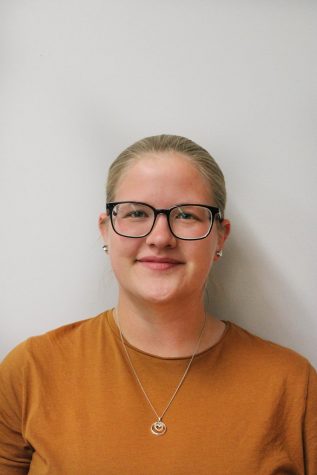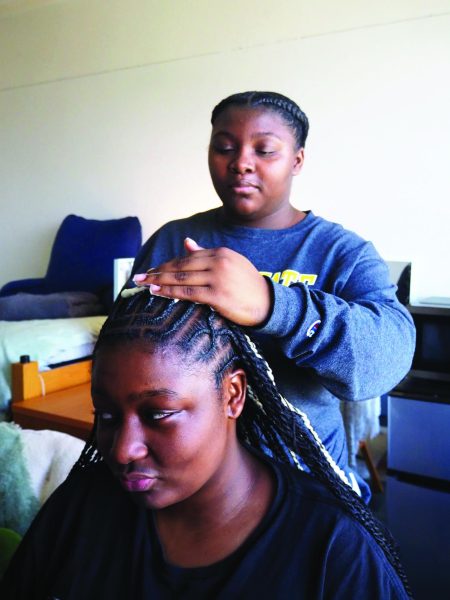History of KWSC, Wayne State’s student radio station

November 17, 2020
From playing music off records to CDs to digital files, KWSC radio station has changed a lot since its official start in 1971. The station is currently in its 50th year of being on air, but Wayne State College has been involved in radio for over a century.
“Really, as far back as the 1916, in what was then called the Department of Physical Sciences, had an experimental radio station operating,” Mike Marek, retired KWSC radio adviser said. “That was at a time where people were just astounded to be able to hear voices and music without wires over the radio.”
In 1922, WSC had a broadcast station that would operate each morning and they would host talk–show with faculty members about the weather, news, and music. This station only lasted until 1924.
“After that, believe it or not, the hospital in Wayne, in the early 1920s, had a radio station called KGCH,” Marek said. “The college provided some programming for it and they closed in 1928.”
For the years following, WSC provided programming to WJAG at Norfolk, which at the time was owned by the Norfolk Daily News.
“In the 1940s, radio production was actually added to the curriculum in what was then the speech curriculum, but now communication studies,” Marek said.
WSC started talks about a student run radio station going on the air in the 1967, and the Wayne State College Foundation paid most of the original expenses.
“The best records we have is that station actually became operating on October 13, 1971 from a Wayne Stater article,” Marek said.
According to the Stater article released on October 18, 1971, the radio station was on air with Pat Bates, the DJ and Joel Knutson, the student manager.
“They started with 160 Watts monaural,” Marek said. “It was said, at that time, the station was the most powerful educational station Nebraska because other education stations at schools where playing were at mainly 10 Watts.”
According to the Stater article, the station played Monday through Friday from 5 p.m. to 10 p.m.
“They played classical music, public affairs and pop programing,” Marek said. “From 8 p.m. to 10 p.m., they had contemporary music.”
The station’s branding was “Mono 92,” and it changed sometime in the 90s to “KWSC92, Where the Squirrels Come to Rock.”
“In 2007, the identity of the station changed to “Your Music Authority, 91.9 the Cat” which it today,” Marek said.
Besides changing its brand, the station moved across campus. It started in the Fine Arts building and moved to Humanities in 2003. The transmitter did not move until 2016 to the Student Services building.
Marek said the early 2000s were a time of change, because the students began to have iPods and mp3 players. The radio stations were struggling to attract younger listeners and KWSC 91.9 worked with WSC Student Senate to make sure they had the most up to date music.
“KWSC 91.9 is different from most college radio stations,” Marek said. “Most college radio stations are either a National Public Radio station or a student activity station. At Wayne, working at the radio station is part of the curriculum and it is a required thing for the electronic media major to do.”
“The radio is a student run station,” Sean Ahern, WSC professor and current KWSC-FM advisor, said. “We have a litany of on–air experiences, but that’s not the only thing you can do at the station.”
Ahern said students can be a production manager, promotional director, podcast director, be involved with their social media, and other radio jobs available.
“A lot of people when they think about radio stations, they think of DJs,” Ahern said. “It is one of those great environments where you can be creative and do the DJ stuff, but you can also do other things that will help you develop your career in different ways.”
To be on the air, students must complete the Radio Production class offered in the fall each year and register for Radio Workshop.
According to the WSC website for KWSC-FM, “If you are not a major, you are still eligible to take Radio Production and Radio Workshop as elective classes.”
The curriculum will teach basic on-air skills such as the equipment, how to use your voice, and how the radio business works.
“We are in a great moment of audio production, where the rise of streaming services like Spotify and Sound Cloud have given us the opportunity to resuscitate the radio drama and sports podcasts,” Ahern said.
Visit https://thecat.wsc.edu/ for more information about the radio and programing or email [email protected].










Ray H. WSC 1995 • Nov 18, 2020 at 2:15 pm
While employment opportunities in commercial radio are fading, the skills I learned as a K92 staffer from 1992-1995 have been among my most valued.
I learned how to schedule and manage a staff as program director. (We were doing live programming 24 hours a day – no automation!) I learned to present news stories in an unbiased way and see things from multiple sides in Broadcast Journalism. I learned how to write clearly and concisely from former radio adviser Dave Ogden. I made friends and connections I value to this day.
These skills and relationships will always be in demand.
As your article states, audio production skills have moved into new areas in the 21st century. Radio remains a great way to learn the ropes for producing podcasts, videos, films, corporate training, and more.
I am thankful for the opportunities that K92 provided for me. In my days there, we were “The Institute of Rock.” At 50 years, it has truly become an institution.
Roseann A. Davis • Nov 18, 2020 at 12:19 pm
During the late 70’s and early 80’s KWSC-FM was branded as “Progressive 92 on your FM dial”.